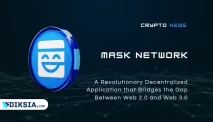Who Are the Founders of Polygon?
Polygon was co-founded by Jaynti Kanani, Sandeep Nailwal and Anurag Arjun, two experienced blockchain developers and a business consultant. Before moving to its network in 2019, the Polygon team was a huge contributor in the Ethereum ecosystem.
They noticed the scalability issues and high gas fees on Ethereum and decided to create a solution that would enhance the user experience and performance of decentralized applications. They also envisioned a platform that would enable interoperability and collaboration among different blockchain networks.
Why is Polygon important?
Polygon is important because it addresses some of the major limitations of Ethereum, such as low throughput, poor user experience, and lack of community governance.
By offering various scaling and infrastructure solutions, Polygon enables developers to create fast, cheap, and secure decentralized applications that can cater to diverse needs and use cases.
Polygon also supports the vision of Web 3.0, where users can access a decentralized internet that is open, transparent, and permissionless.
What Makes Polygon Unique?
Polygon is unique because it offers a flexible and modular framework that allows developers to choose the best scaling solution for their needs. Polygon supports both layer 2 solutions (such as ZK rollups and optimistic rollups) and sidechains (such as Plasma and Proof-of-Stake chains).
Polygon also enables the creation of stand alone chains or enterprise chains that can have their own consensus mechanisms and features.
Moreover, Polygon aims to create a network of networks that can communicate and exchange value with each other seamlessly. This means that users can access multiple blockchains and applications without leaving the Ethereum ecosystem.
What are the key features of Polygon?
Some of the key features of Polygon are:
- High scalability: Polygon can process up to 65,000 transactions per second on a single sidechain, with a block confirmation time of less than two seconds.
- Low cost: Polygon reduces the gas fees on Ethereum by using its own native token MATIC as the gas currency. Users can transact on Polygon with near-zero fees.
- Security: Polygon leverages the security of Ethereum by using a set of validators who stake MATIC tokens to secure the network. Polygon also uses fraud proofs and data availability checks to ensure the validity of transactions.
- User experience: Polygon improves the user experience of decentralized applications by offering fast transactions, easy onboarding, and seamless interoperability.
- Developer experience: Polygon provides a user-friendly SDK that simplifies the development process and supports multiple programming languages. Developers can also access various tools and resources to build and deploy their applications on Polygon.
Polygon History
Polygon was originally launched in 2017 as Matic Network. It rebranded to Polygon in 2021. The MATIC token was first issued in an initial coin offering (ICO) in 2017. The ICO raised $5 million. Polygon has been growing rapidly in recent months. The MATIC token price has increased by over 1000% in the past year.






